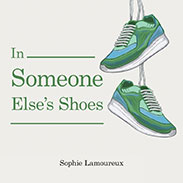
 |
Lyla and Rachel are in the same fourth grade. Lyla notices that Rachel's life differs from hers. Lyla has an abundance of food at lunch, but Rachel only has half a sandwich and chips instead of fruit. Although Lyla is at first envious of the snack versus the healthy food that she has, her mother explains that Rachel's mother probably doesn't have enough money to buy the variety of food that Lyla enjoys. At another time, Lyla's mother packs an extra sandwich and an apple in her daughter's lunch box so Rachel can have lunch that day. After a party for Lyla, at which Rachel is a guest, Lyla's mother gives Rachel some food to take home—a whole pizza.
Other differences are apparent, as well. Rachel has fewer (and older) clothes than Lyla. Rachel's mother, who works full time, does not have the time or money to permit Rachel to participate in gymnastics or to have a large birthday party. However, demonstrating her love, Rachel's mom bakes her daughter a cake to celebrate. Displaying her growing empathy, Lyla tries to think of ways in which Rachel's life will have more parity with hers. An extremely important factor in the story is that the two moms and their daughters engage in these situations with love and respect for one another and positive thoughts and efforts for the future.
This children's story strums resonant chords. Nearly everyone has some ability to give people a hand up, and empathy and intelligence on everyone's part show the ways. The author is a medical student who has seen that "social determinates of health, such as income and education," coupled with literacy and empathy, can impact individuals and communities in truly significant ways.
RECOMMENDED by the US Review